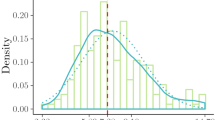Abstract
In a laboratory experiment with 113 male university students, probability of succeeding at an arithmetic task was set at either .25, .50, or .75. This objective probability of success was linealy and positively related to subjective probability of success and to level of performance. No significant main effects of the trait of generalized expectancy of task success were found either on subjective probability of success or on performance. However, the more specific trait of expectancy of success at numerical tasks, with measured ability held constant, did show significant positive effects on subjective probability of success and performance. These results suggest that persons with high self-appraisals in a particular skill area form higher subjective probabilities of success and perform at higher levels on tasks calling for those skills than do persons with low self-appraisals, even though they do not differ in measured ability.
Similar content being viewed by others
References
Arvey, R. D.An experimental investigation of the effects of two kinds of expectancies on the performance of a laboratory task. Unpublished doctoral dissertation, University of Minnesota, 1970.
Atkinson, J. W. Towards experimental analysis of human motivation in terms of motives, expectancies, and incentives. In J. W. Atkinson (Ed.),Motives in fantasy, action, and society. Princeton: Van Nostrand, 1958.
Atkinson, J. W.,An introduction to motivation. Princeton: Van Nostrand, 1964.
Atkinson, J. W. The mainsprings of achievement-oriented activity. In J. W. Atkinson & J. O. Raynor (Eds.),Motivation and achievement. Washington, D.C.: Winston, 1974.
Bennett, G. K., & Gelink, M.Manual for the Short Employment Tests. New York: Psychological Corp., 1956.
Campbell, J. P., & Pritchard, R. D. Motivation theory in industrial and organizational psychology. In M. D. Dunnette (Ed.),Handbook of industrial and organizational psychology, Chicago: Rand McNally, 1976.
Escalona, S. K. The effect of success and failure upon the level of aspiration and behavior in manic-depressive psychoses.University of Iowa Studies in Child Welfare 1940,16 199–302.
Festinger, L.A theory of cognitive dissonance. Evanston, Illinois: Row, Peterson, 1957.
Ghiselli, E. E.Explorations in managerial talent. Pacific Palisades, California: Goodyear, 1971.
Gough, H. G., & Heilbrun, A. B.The Adjective Check List Manual. Palo Alto: Consulting Psychologists Press, 1965.
Heider, F.The psychology of interpersonal relations. New York: Wiley, 1958.
Keppel, G.Design and analysis: A researcher's handbook. Englewood Cliffs, New Jersey: Prentice-Hall, 1973.
Korman, A. K. Toward an hypothesis of work behavior.Journal of Applied Psychology 1970,54 31–41.
Kukla, A. Foundations of an attributional theory of performance.Psychological Review 1972,79 454–470.
Lawler, E. E.Motivation in work organizations. Monterey, California: Brooks/Cole, 1973.
Lewin, K.The conceptual representation and the measurement of psychological forces. Durham, North Carolina: Deuk University Press, 1938.
Mitchell, T. R. Expectancy models of job satisfaction, occupational preference and effort: A theoretical, methodological, and empirical appraisal.Psychological Bulletin 1974,81 1053–1077.
Motowidlo, S. J. Development of a measure of generalized expectancy of task success.Educational and Psychological Measurement 1979,39 69–80.
Motowidlo, S. J. Construct validity for a measure of generalized expectancy of task success.Educational and Psychological Measurement, in press.
Motowidlo, S. J., Loehr, V., & Dunnette, M. D. A laboratory study of the effects of goal specificity on the relationship between probability of success and performance.Journal of Applied Psychology 1978,63 172–179.
Moulton, R. W. Motivational implications of individual differences in competence. In J. W. Atkinson & J. O. Raynor (Eds.),Motivation and achievement. Washington, D.C.: Winston, 1974.
Rotter, J. B. Generalized expectancies for internal versus external control of reinforcement.Psychological Monographs, 1966,80(1, Whole No. 609).
Vroom, V. H.Work and motivation. New York: Wiley, 1964.
Weiner, B., Heckhausen, H., Meyer, W., & Cook, R. E. Causal ascriptions and achievement behavior: Conceptual analysis of effort and reanalysis of locus of control.Journal of Personality and Social Psychology 1972,21 239–248.
Weisman, A. G.Manual for the Wesman Personnel Classification Test. New York: Psychological Corp., 1956.
Author information
Authors and Affiliations
Additional information
Research reported here is based on a portion of a dissertation prepared at at the University of Minnesota in partial fulfillment of the requirements for the doctoral degree. Grateful appreciation is extended to John P. Campbell, who served as thesis advisor.
Rights and permissions
About this article
Cite this article
Motowidlo, S.J. Effects of traits and states subjective probability of task success and performance. Motiv Emot 4, 247–262 (1980). https://doi.org/10.1007/BF00995423
Issue Date:
DOI: https://doi.org/10.1007/BF00995423




